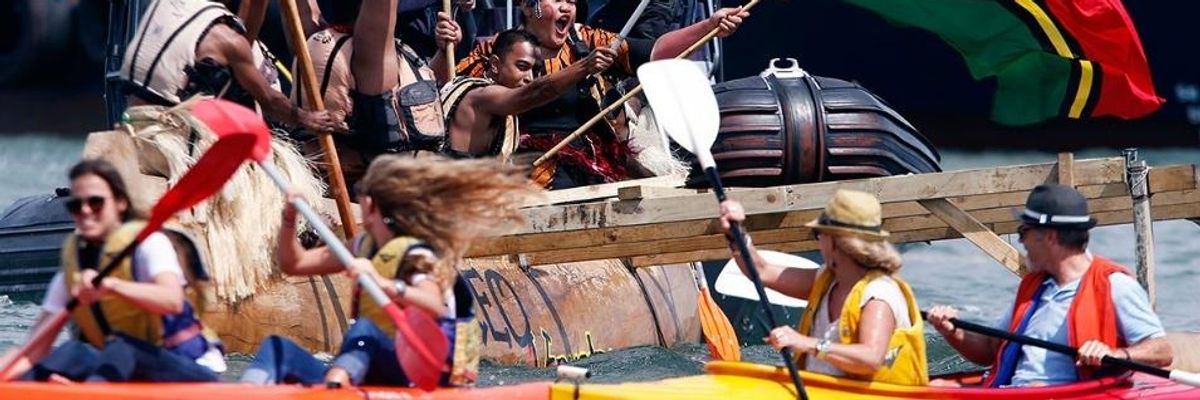Speaking on a conservative talk radio show last week, Attorney General Jeff Sessions denounced a decision issued by Derrick K. Watson, a federal judge in Hawaii, blocking Trump's Muslim travel ban: "I really am amazed that a judge sitting on an island in the Pacific can issue an order that stops the president of the United States from what appears to be clearly his statutory and constitutional power."
In one sentence, Sessions turned "island" and "Pacific" into swear words, and expelled Hawaii from the United States. Presumably, for Sessions, had the judge been sitting someplace in the real world, someplace that matters, like St. Louis or Dallas, that might have been home to a more credible challenge to Trump's travel ban. But an island in the Pacific? Contemptuous.
Sessions' sneering remark must feel familiar to so many Pacific Islanders whose lands and lives have been the playthings of imperial powers--especially the United States. It reveals an attitude which, in the shadow of the climate crisis, has genocidal implications.
I spent this past week with Kathy Jetnil-Kijiner, a remarkable spoken word artist from the Marshall Islands, located in the Pacific Ocean about halfway between Hawaii and Australia. The Portland Public Schools Climate Justice Committee had hired Kathy to perform her poetry and lead writing workshops with students and staff in Portland, Oregon, middle schools and high schools.
Jetnil-Kijiner began most of her presentations with a poem that described an incident when she was a 15-year-old high school student, then living in Hawaii. She had entered a history project competition, designing a poster-board presentation on nuclear testing in the Marshall Islands. From 1946 to 1958 the United States tested 67 nuclear weapons in the Marshall Islands. As Washington Post writer Dan Zak noted in his article, "A Ground Zero Forgotten," if these weapons' "combined explosive power was parceled evenly over that 12-year period, it would equal 1.6 Hiroshima-size explosions per day."
In her poem "History Project," Jetnil-Kijiner recalls herself as a curious high schooler, and describes what she learned about how these explosions poisoned people in the Marshall Islands:
I read first-hand accounts of what we call
jelly babies
tiny beings with no bones
skin--red tomatoes
the miscarriages gone unspoken
the broken translations
I never told my husband
I thought it was my fault
I thought
there must be something wrong
inside me
Kathy lost the high school History Project competition. When she performed her piece for Portland students, she acknowledged the poem's sad and sudden end: "And I lost." She noted that this conclusion underscores the enormity of loss in the Marshalls--no one will ever be able to live on radioactive Bikini Atoll; the carcinogenic legacy in the Marshalls is one of the worst in the world--and in her workshops, Jetnil-Kijiner asked students to reflect on the connection between nuclear testing and climate change.
Students were astute: They both concern the loss of land, of culture, of voices. As Jetnil-Kijiner summed up, "We know about losing islands. We come to the climate change issue with this background."
Sessions' flip dismissal of islands in the Pacific holds up a mirror to the Trump administration's dismissal of climate change, which promises a future of rising oceans, devastating superstorms, and drought, with life-changing consequences for people in the Marshall Islands, Kiribati, Tuvalu, Niue, the Ryukyu Islands, and too many others to name. In fact, for many, this is not the future, this is the present. It's why people in frontline communities demand a global commitment to policies that keep the climate from warming more than 1.5 degrees Celsius over pre-industrial times. Anything less ambitious is a cultural death warrant. Instead, Trump celebrates coal-burning, nominates a climate denial champion to head the Environmental Protection Agency, and threatens to pull out of the Paris Climate Accord.
For Portland students, Kathy Jetnil-Kijiner performed her poem, "Tell Them," about what she wants the world to know about the Marshall Islands, especially the threat of climate change:
tell them
we only have one road ...
tell them about the water
how we have seen it rising
flooding across our cemeteries
gushing over the sea walls
and crashing against our homes
tell them what it's like
to see the entire ocean level with the land
tell them
we are afraid ...
but most importantly tell them
we don't want to leave
we've never wanted to leave
and that we
are nothing without our islands.
As Kathy told students, "Every reef has a story, a chant, a song." We are nothing without our islands.
The writer Wendell Berry once wrote that social elites "cannot take any place seriously because they must be ready at any moment, by the terms of power and wealth in the modern world, to destroy any place." In an unguarded moment on a conservative talk radio show, Jeff Sessions offered a perfect illustration of this insight.
Pacific Islands? No one who matters lives there. People there are invisible--at least to Sessions and his ilk.
That's the bad news. The good news is that Pacific Island poet-prophets like Kathy Jetnil-Kijiner are helping us wake up to the climate emergency. In "Dear Matafele Peinam," the poem Kathy addressed to her daughter, and performed at the UN Secretary General's Climate Summit in 2014--and to almost 1,000 students in 18 sessions last week in Portland--she blasts a warning about the catastrophe-in-the-making, but also trumpets the growing climate movement. "There are those who see us," she says:
we are
canoes blocking coal ships
we are
the radiance of solar villages
we are
the rich clean soil of the farmer's past
we are
petitions blooming from teenage fingertips ...
and there are thousands out on the street
marching with signs
hand in hand
chanting for change now
